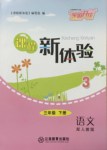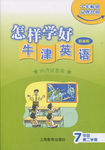
 芝麻开花课程新体验系列答案
芝麻开花课程新体验系列答案 怎样学好牛津英语系列答案
怎样学好牛津英语系列答案科目:高中英语 来源: 题型:
此题要求改正所给短文中的错误。对标有题号的每一行作出判断:如无错误,在该
行右边横线上画一个勾(√);如有错误(每行只有一个错误),则按下列情况改正:
此行多一个词:把多余的词用斜线(\)划掉,在该行右边横线上写出该词,并也用斜线划掉。
此行缺一个词:在缺词处加一个漏字符号(![]() ),在该行右边横线上写出该加的词。
),在该行右边横线上写出该加的词。
此行错一个词:在错的词下划一横线,在该行右边横线上写出改正后的词。
注意:原行没有错的不要改
Dear Sally,
Now I’d like to tell you something about my part-time job in this ___________
summer vacation, in which I worked like a guide in a travel agency. __________
The work was interesting but tired. I think it was helpful to work this ___________
holiday. This was the first time that I have earned money on my own. ___________
I’ve come to understand how hard my parents work to support for _________
the family . I used to keep on ask them for money, but now I’ll never __________
waste money and learn to share worry with my parent. I’ve learnt how ___________
to get along well with others. What’s worse, I’ve gained some working _________
and social experience and I have learnt something can’t be learnt from ___________
textbooks. All this will be good for my future. In the word, I had a __________
wonderful and valuable summer vacation.
查看答案和解析>>
科目:高中英语 来源: 题型:
Robert is nine years old and Joanna is seven. They live at Mount Ebenezer. Their father has a big property. In Australia they call a farm a property.
Robert and Joanna like school very much. At school they can talk to their friends but Robert and Joanna cannot see their friends. They live 100, perhaps 300, miles away and like Robert and Joanna, they all go to school by radio.
Mount Ebenezer is in the center of Australia. Not many people live in “The Center”. There are no schools with desks and blackboards and no teachers in “The Center”. School is a room at home with a two-way radio. The teacher also has a two-way radio. Every morning she calls each student on the radio. When all students answer, lessons begin… Think of your teacher 300 miles away!
The children in “The Center” do not go to a school because ______.
A. they live too far away from one another B. they do not like school
C. they are not old enough to go to school D. their families are too poor
In order to send their children to school, parents in “The Center” of Australia must have ______.
A. a property B. a car
C. a school room at home D. a special radio
Teachers in “The Center” of Australia teach ______.
A. not in a classroom but at the homes of the students
B. by speaking only and not showing anything in writing
C. without using any textbooks or pictures
D. without knowing whether the students are attending
A “property” in Australia is a ______.
A. house B. school C. farm D. radio
查看答案和解析>>
科目:高中英语 来源: 题型:阅读理解
In the city of Fujisawa, Japan, lives a woman named Atsuko Saeki When she was a teenager, she 36 of going to the United States. Most of what she knew about American 37 was from the textbooks she had read. "I had a 38 in mind: Daddy watching TV in the living room,
Mummy 39 cakes and their teenage daughter off to the cinema with her boyfriend."
Atsuko 40 to attend college in
One of her hardest 43 was physical education. "We played volleyball." she said.
"The other students were 44 it, but I wasn't."
One afternoon, the instructor asked Atsuko to 45 the ball to her teammates so they could knock it 46 the net- NO problem for most people, but it terrified Atsuko. She was afraid of losing face 47 she failed.
A young man on her team 48 What she was going through." He walked up to me and 49 , 'Come on. You can do that'"
"You will never understand how those words of 50 made me feel.. Four words: You can do that I felt like crying with happiness"
She made it through the class. Perhaps she thanked the young man; she is not 51 .
Six years have passed. Atsuko is back in
She is sure the young man had no idea how much his kindness 53 to her. "He probably doesn't even remember it," she said. That may be the lesson. Whenever you say something to a person cruel or kind---you have no idea how long the words will 54. She's all the way over in
36. A. learned B. spoke C. dreamed D. heard
37. A. way B. life C. education D. spirit
38. A. photo B. painting C. picture D. drawing
39. A. baking B. frying C. steaming D. boiling
40. A. hoped B. arranged C. liked D. attempted
41. A. described B. imagined C. created D. discovered
42. A. tense B. cheerful C. relaxed D. deserted
43. A. times B. question C. classes D. projects.
44. A. curious about B. good at C. slow at D. nervous about
45. A. kick B. pass C. carry D. hit
46. A. through B. into C. over D. past
47. A. after B. if C. because D. until
48. A. believed B. considered C. wondered D. sensed
49. A. warned B. sighed C. ordered D. whispered
50. A. excitement B. encouragement C. persuasion D. suggestion
51. A. interested B. doubtful C. puzzled D. sure
52. A. never B. already C. seldom D. almost
53. A. happened B. applied C. seemed D. meant
54. A. continue B. stay C. exist D. live
55. A. merciful B. bitter C. simple D. easy
查看答案和解析>>
科目:高中英语 来源:2013-2014学年山东省临沂市高三3月教学质量检测英语试卷(解析版) 题型:阅读理解
Noah Webster, born on October 16, 1758 , is known for The American Dictionary of the English Language. He has been called the " Father of American Scholarship and Education. " His " Blue-Backed Speller" books were used to teach spelling and reading to five generations of American children. But how much .do you know about him beyond that?
At the age of 16, Noah Webster began attending ,Yale College. Unfortunately, he spent his four years at Yale during the American Revolutionary War, and, because of food shortages, many of his college classes were held in Glastonbury, Connecticut. Later, he served in the army.
Having graduated from Yale in 1778, Webster wanted to continue his education in order to earn his law degree. He had to teach school in order to pay for his education. He set up many small schools that didn't survive, but he was a good teacher because instead of forcing his students to learn, like most teachers did, he rewarded them. He earned his law degree in 1781, but did not practice law until 1789. Once he started he found the law was not to his liking.
Webster did not have much money. In 1793 , Alexander Hamilton lent him $ 1500 to move to New York City to edit a newspaper. In December, he founded New York ' s first daily newspaper, American Minerva, and edited it for four years. For decades, he published . textbooks, political essays, a report on some diseases, and newspaper articles for his party, He wrote so much that a modern list of his published works required 655 pages .Noah Webster died on May 28, 1843 and was buried in the Grove Street Cemetery.
1.What's the main idea of Paragraph l?
A. Webster's famous dictionarie .
B. Webster's daily routines.
C. Webster's main achievements.
D. Webster's college education.
2.Which of the following best describes Webster's life at Yale?
A. Tough. B. Smooth. C. Normal. D. Tiring.
3.What did Noah want to be after graduation from Yale?
A. A teacher. B. A lawyer. C. A headmaster. D. A scholar.
4.Why was Webster a good teacher?
A. Because he set up many small schools.
B. Because he graduated from Yale College,
C. Because he forced his students to learn.
D. Because he often rewarded his students.
5.What can we infer from Paragraph 4?
A. Webster was a most productive author.
B. Webster led a miserable life in New York City.
C. Webster's books added up to 655 pages.
D. Webster didn't write any polifical works.
查看答案和解析>>
科目:高中英语 来源:2013-2014学年四川省高三二诊模拟英语试卷(解析版) 题型:阅读理解
Children start out as natural scientists, eager to look into the world around them. Helping them enjoy science can be easy; there’s no need for a lot of scientific terms or expensive lab equipment. You only have to share your children’s curiosity. Firstly, listen to their questions. I once visited a classroom of seven-year-olds to talk about science as a job. The children asked me “textbook questions” about schooling, salary and whether I liked my job. When I finished answering, we sat facing one another in silence. Finally I said, “Now that we’re finished with your lists, do you have questions of your own about science?”
After a long pause, a boy raised his hand, “Have you ever seen a grasshopper(蚱蜢) eat? When I try eating leaves like that, I get a stomachache. Why?”
This began a set of questions that lasted nearly two hours.
Secondly, give them time to think. Studies over the past 30 years have shown that, after asking a question, adults typically wait only one second or less for an answer, no time for a child to think. When adults increase their “wait time” to three seconds or more, children give more logical, complete and creative answers.
Thirdly, watch your language. Once you have a child involved in a science discussion, don’t jump in with “That’s right” or “Very good”. These words work well when it comes to encouraging good behavior. But in talking about science, quick praise can signal that discussion is over. Instead, keep things going by saying “That’s interesting” or “I’d never thought of it that way before”, or coming up with more questions or ideas.
Never push a child to “Think”. It doesn’t make sense, children are always thinking, without your telling them to. What’s more, this can turn a conversation into a performance. The child will try to find the answer you want, in as few words as possible, so that he will be a smaller target(目标) for your disagreement.
Lastly, show; don’t tell. Real-life impressions of nature are far more impressive than any lesson children can learn from a book or a television program. Let children look at their fingertips through a magnifying glass(放大镜), and they’ll understand why you want them to wash before dinner. Rather than saying that water evaporates(蒸发), set a pot of water to boil and let them watch the water level drop.
1.According to the passage, children are natural scientists, and to raise their interest, the most important thing for adults to do is _______.
A. to let them see the world around
B. to share the children’s curiosity
C. to explain difficult phrases about science
D. to supply the children with lab equipment
2. In the last sentence of the first paragraph, the word “lists” could best be replaced by ______.
A. any questions B. any problems
C. questions from textbooks D. any number of questions
3.According to the passage, children can answer questions in a more logical, complete and creative way if adults ________.
A. ask them to answer quickly
B. wait for one or two seconds after a question
C. tell them to answer the next day
D. wait at least for three seconds after a question
4.In which of the following paragraph(s) does the author tell us what to say to encourage children in a science discussion?
A. The second and third. B. The fourth and fifth.
C. The fifth and sixth. D. The fifth.
5.The author mentions all of the following techniques for adults to share with their children’s curiosity except that adults should ________.
A. tell their children stories instead of reciting(背诵) facts.
B. offer their children chances to see things for themselves.
C. be patient enough when their children answer questions.
D. encourage their children to ask questions of their own.
查看答案和解析>>
湖北省互联网违法和不良信息举报平台 | 网上有害信息举报专区 | 电信诈骗举报专区 | 涉历史虚无主义有害信息举报专区 | 涉企侵权举报专区
违法和不良信息举报电话:027-86699610 举报邮箱:58377363@163.com